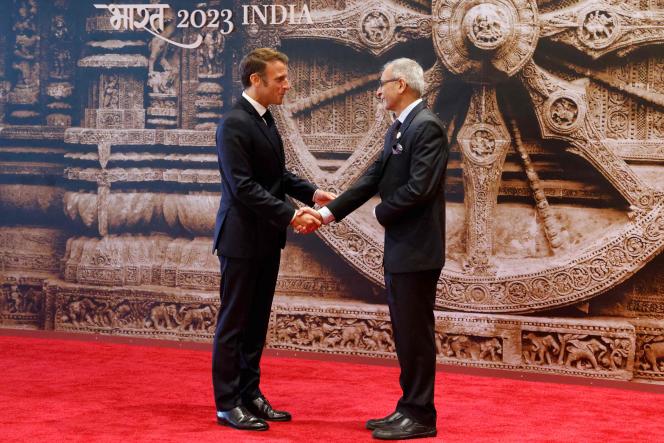Africa is not as such on the menu of the G20, which is being held in New Delhi on September 9 and 10, unlike the war in Ukraine. But the coups d’etat in Niger and then in Gabon which occurred this summer complicate the diplomatic return of Emmanuel Macron, Paris seeming overwhelmed by the sequence of events on the continent.
The Head of State arrived a little late in India, Saturday at midday, after having attended, the evening before, the opening of the Rugby World Cup, and the victory of the XV of France against New Zealand. In the morning, it was Bruno Le Maire, his Minister of the Economy, who replaced him for the opening of the summit, alongside the heads of state and government of the twenty main economies of the planet. Mr. Macron is expected to spend one night and less than thirty hours in India, before flying to Bangladesh on Sunday and returning to Paris on Monday evening.
At the G20, Ukraine is at the heart of tensions between Westerners and emerging countries, but France’s setbacks in the Sahel, in its former African backyard, should focus much of the Head of State’s attention. . Barely arrived, Mr. Macron was to participate in a meeting with representatives of the European Union and the African Union, just admitted to the G20.
Firmness on the Niger issue
A little later, Emmanuel Macron could also meet face to face with the President of Nigeria, Bola Tinubu, guest of the summit. At the head of the Economic Community of West African States (ECOWAS), the latter first showed himself to be at the forefront, with the support of Paris, on the subject of a possible intervention by the forces of the region in order to restore constitutional order in Niamey. But this option seems more and more uncertain.
The Head of State remains in regular telephone contact with the Nigerien President, Mohamed Bazoum, overthrown by the military on July 26, still kidnapped with his family. The more the days pass, the more the return to power of the elected president, demanded by Paris, seems hypothetical. In the short term, Mr. Macron is therefore forced to examine the various options on the table to redeploy the French forces devoted to the fight against terrorism, which the Nigerien junta is demanding to leave. It could decide in the coming days, in order to decide on the withdrawal of some, or even all, of the French soldiers present on site.
In Niger, the president has wanted so far to show firmness, his entourage ensuring to learn the lessons of the putschs of recent years in Mali and Burkina Faso, which led to the dismantling of the operation “Barkhane”. But this positioning did not convince the American and European allies, who were much more cautious in the face of the putschists in Niamey. A reserve at the origin of a certain “bitterness” in Paris, according to a European diplomat.
You have 39.51% of this article left to read. The rest is reserved for subscribers.
